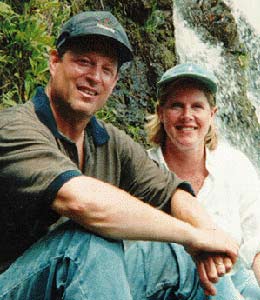Vice President Al Gore

 |
Distinguishing himself as a Democratic leader
by Beth Rowen |
 Gore's agenda includes gun-control regulation, environmental protection, and Internet access in schools. Vital Statistics
 Gore with wife, Tipper. He is passionate about the environment, and penned Earth in the Balance: Ecology and the Human Spirit. Related Links |
By all accounts, Vice President Al Gore should be boasting that the longest period of uninterrupted economic growth, low unemployment, and three consecutive budget surpluses are reasons to keep a Democrat in the Oval Office. Instead, he has been reluctant to connect himself in any way with the Clinton administration in fear of alienating voters who are repulsed by President Clinton's personal behavior.
Gore took a giant step in distancing himself from Clinton’s scandal-riddenpresidency in early August when he selected Sen. Joe Lieberman as his running mate. The move was a defensive one, intended to blunt attacks from the Bush camp over the rectitude of the Democratic ticket.
Lieberman, known for his moral compass, has been one of the most outspoken Democrat critics of Clinton's affair with Monica Lewinsky. Gore himself has characterized Clinton's behavior as "awful," "inexcusable," and a yearlong "waste of time."
Becoming a Distinguished Gentleman
While Gore has taken the first step in distinguishing himself from Clinton, he now faces the difficult task of highlighting his own accomplishments over the last seven years.
Gore has mostly been a behind-the-scenes player. Early in Clinton's first term, the president enlisted Gore to study the entire federal government to pinpoint wasteful areas. Gore's National Performance Review guided Clinton when he downsized the government. The vice president was also instrumental in the passage of 1993's North American Free Trade Agreement.
The president has often looked to Gore for advice on foreign-policy issues. In fact, Gore favored action against Yugoslav President Slobodan Milosevic long before the first shot was fired. His call for military intervention somewhat contradicts his humanitarian nature. When democracy or human rights are at stake, Gore has historically endorsed military intervention rather than diplomacy, as he did in Haiti.
Wired Al
The environment and the Internet have been Gore's signature passions, both as vice president and as a senator and congressman from Tennessee. Gore beefed up on the imminent environmental crisis as a senator, becoming an expert on global warming, the depletion of the ozone layer, the destruction of rain forests, and new earth friendly technology. He penned the best-selling 1992 book, Earth in the Balance: Ecology and the Human Spirit.
"I see a 21st Century economy where innovation and high technology not only fuel high-paying jobs, but help connect more families to our prosperity." – Vice President Al Gore |
Gore was cruising the Internet superhighway long before it was cool and has promoted its rapid growth. As vice president he instituted a federal program to wire all schools and libraries to the Internet. In a campaign speech, he said he wants all kids to be computer savvy by eighth grade and favors online tutoring and interactive classrooms.
Gore has also been embroiled in his own controversies, notably when he was investigated for soliciting donations from White House telephones, a no-no under the campaign finance laws. And he can't seem to shake his robotic image. Indeed, even when he tries to loosen up, only the volume of his voice changes.
A lifetime insider
The vice president has been a Washington insider all his life. His father, Al Gore, Sr., was also a senator from Tennessee and exposed his young son to the likes of John F. Kennedy and Sam Rayburn. He attended Washington's elite St. Albans School and went on to Harvard, where he roomed with actor Tommy Lee Jones. He graduated in 1969 and married Mary Elizabeth "Tipper" Aitcheson in 1970. (The nickname comes from Tipper's favorite childhood lullaby "Tippy Tippy Tin.") He and Tipper met at his senior prom. The Gores have four children, Karenna Gore Schiff, Kristin, Sarah, and Al III. Karenna recently gave birth to a son, Wyatt, the Gores' first grandchild.
On Christmas day in 1971, Gore left for Vietnam and served as a reporter for the "Stars and Stripes" for six months. When he returned, he worked as an investigative reporter with the Nashville Tennessean from 1971-1976 and took courses at Vanderbilt University's divinity and law schools.
He was first elected to the U.S. House of Representatives in 1976 and won easy reelection in 1978, 1980, and 1982. As a representative he served on the House Intelligence Committee and spent eight hours a week pouring over arms-control literature. His paper, published in Congressional Quarterly, concluded that the single-warhead missile could help stem the nuclear arms race.
In 1985, Gore won the senate seat vacated by Senate Majority Leader Howard Baker, Jr. and served two terms. He launched a bid for the presidency in 1987. On Super Tuesday in 1988 he won the primaries in five southern states, but he wasn't able to maintain the momentum and dropped out of the race.
Twelve years later, Gore is back on the campaign trail, a step closer to the job he's been preparing for all his life.







